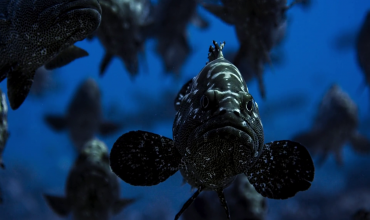Menu
-
Login/Register
Great to have you back!
New here? Create a new Account
Error
Notification
-
or
Move to the previous cue
-
or
Move to the next cue
-
or
Increase size of captions
-
or
Decrease size of captions
-
or
Translate current cue
Words/Phrase translation
Miniseries "Blue Planet II" » The Deep
00:58:08
David Attenborough
73
Nouns
-
1)
lanternfish
Only at night, do vast shoals of lanternfish
-
2)
flapjack
The flapjack octopus.
-
3)
tonn
Thirty tonn of it.
-
4)
profusion
there is a profusion of life.
-
5)
microbe
To provide sustenance for these microbe,
-
6)
sustenance
To provide sustenance for these microbes,
-
7)
blackness
into the world of perpetual blackness below.
-
8)
shoal
Only at night, do vast shoal of lanternfish
-
9)
larva
were swept into this sponge when they were tiny larva,
-
10)
mussel
Giant mussel that can live or grow for a century or more,
-
11)
ravine
Down here, in these deep ravine,
-
12)
millennia
that have flourished here for millennia
-
13)
submersible
and her twin submersible, Deep Rover and Nadir.
-
14)
scavenger
A month on, and over 30 species of scavenger
-
15)
kilo
Two metres long and 50 kilo in weight.
-
16)
underside
right up to the underside face of an iceberg.
-
17)
puddle
a puddle is forming on the floor of the sub.
-
18)
carcass
the carcass of a huge sperm whale
Verbs
-
1)
dislodge
Some of the whale's teeth have been dislodge
-
2)
submerge
Sinking down beside the submerge wall of an iceberg,
-
3)
gush
Gases and scalding water gush up through the crevices.
-
4)
illuminate
Hunters illuminate themselves,
-
5)
cram
are cram into a single square metre.
-
6)
descend
No human being has ever descend into the depths that surround it...
-
7)
flourish
that have flourish here for millennia
-
8)
dissolve
dissolve in the searingly hot fluid.
-
9)
enrich
that enrich the Antarctic deep seabed
-
10)
plunge
Canyons that plunge towards the centre of the earth.
-
11)
accumulate
it accumulate in great pools on the sea floor.
-
12)
gorge
The first arrival has gorge
-
13)
migrate
migrate to the surface to feed on tiny plankton.
-
14)
dwarf
A tube of jelly two metres long that dwarf a visitor from above,
-
15)
fade
The sunlight fade,
-
16)
sweep
were swept into this sponge when they were tiny larvae,
-
17)
tear
the ocean floor is being torn apart.
-
18)
steal
and steal its catch.
Adverbs
-
1)
in.
They're now far too big to go out the way they came in.
-
2)
ominously
The Sound is ominously known as "Iceberg Alley".
-
3)
habitually
Scabbardfish, habitually swimming upright,
-
4)
delicately
as it delicately sifts through it searching for worms.
-
5)
graphically
make it possible to graphically reconstruct an image
-
6)
exceptionally
have an exceptionally acute sense of smell.
-
7)
seldom
They seldom go deeper
-
8)
tightly
pack tightly together,
-
9)
presumably
presumably as makeshift body armour.
-
10)
upright
Scabbardfish, habitually swimming upright,
-
11)
permanently
Its right eye looks permanently downwards.
-
12)
repeatedly
They repeatedly clone themselves,
-
13)
nowhere
it seems that there is nowhere in the deep sea
-
14)
solely
Without sunlight, they rely solely on food
-
15)
virtually
Siphonophores are virtually eternal.
-
16)
potentially
The waters of the Antarctic Sound are potentially rich,
-
17)
somewhere
then surely it could exist somewhere out there.
-
18)
eventually
some eventually growing longer than a blue whale.
Adjectives
-
1)
ravenous
Two more ravenous sixgills arrive.
-
2)
voracious
Like most squid, they're voracious hunters.
-
3)
miniscule
manage to survive on the miniscule amount of food that drifts down here.
-
4)
unforgiving
we enter an unforgiving world.
-
5)
uppermost
to the uppermost limit of the Twilight Zone,
-
6)
inquisitive
attract inquisitive prey.
-
7)
unimaginable
But, in fact, we find life here in unimaginable abundance.
-
8)
fraught
But that is a strategy fraught with danger.
-
9)
bustling
Next time, we travel to bustling coral reefs.
-
10)
squat
dwarfing the shrimps and squat lobsters that feed around them.
-
11)
dazzling
produce dazzling displays of light.
-
12)
luminous
A decoy of luminous ink.
-
13)
oceanic
an oceanic whitetip shark.
-
14)
edible
are clearing away the last edible fragments.
-
15)
gigantic
gigantic cracks stretch for many miles across the ocean floor.
-
16)
volcanic
Over three quarters of the planet's volcanic activity
-
17)
perpetual
Its eyes are as big as tennis balls to help it see in the perpetual dusk.
-
18)
antarctic
Nor is such great abundance confined to Antarctic waters.

